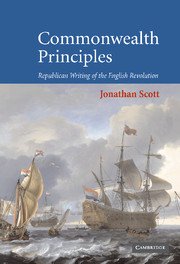3 - Discourses of a commonwealth
Published online by Cambridge University Press: 22 September 2009
Summary
[In the] Times of our Monarchs … Injustice, Oppression and Slavery were the [lot of] the Common people … [It] was intended for the fate of England, had our Monarch prevailed over us … That [we would be] … contented with Canvas clothing, and Wooden shoes, and look more like Ghosts then men … To bring this to pass, their Beasts of Forrests must grow fat, by devouring the poor man's corn … A Tradesman furnishing a great man with most part of his Stock … and expecting due … payment, is answered with ill words, or blows, and the dear-bought Learning, That Lords and Kings servants are priviledged from Arrests and Process of Law … A poor Waterman … a poor Countreyman … must serve the King for … not enough to finde themselves bread, when their wives and children have nothing … [alongside the] luxury and intemperance, the corrupt … maners … of … the noblest Families.
A Declaration of the Parliament (March 1649)THE ENGLISH COMMONWEALTH
In Harrington's The Commonwealth of Oceana (1656) the collapse of monarchy in England is explained almost entirely in economic and social terms. In its place, Harrington's proposed new ‘orders of a Commonwealth’ are supported by a regulated economic and social foundation, secured by an agrarian law.
- Type
- Chapter
- Information
- Commonwealth PrinciplesRepublican Writing of the English Revolution, pp. 63 - 84Publisher: Cambridge University PressPrint publication year: 2004



